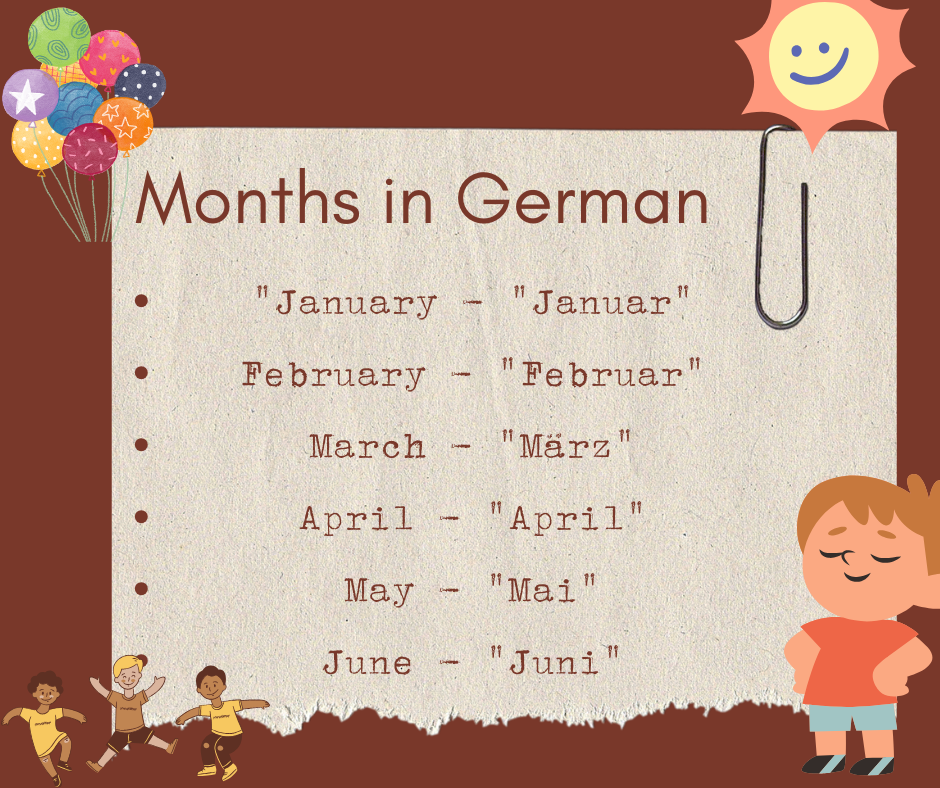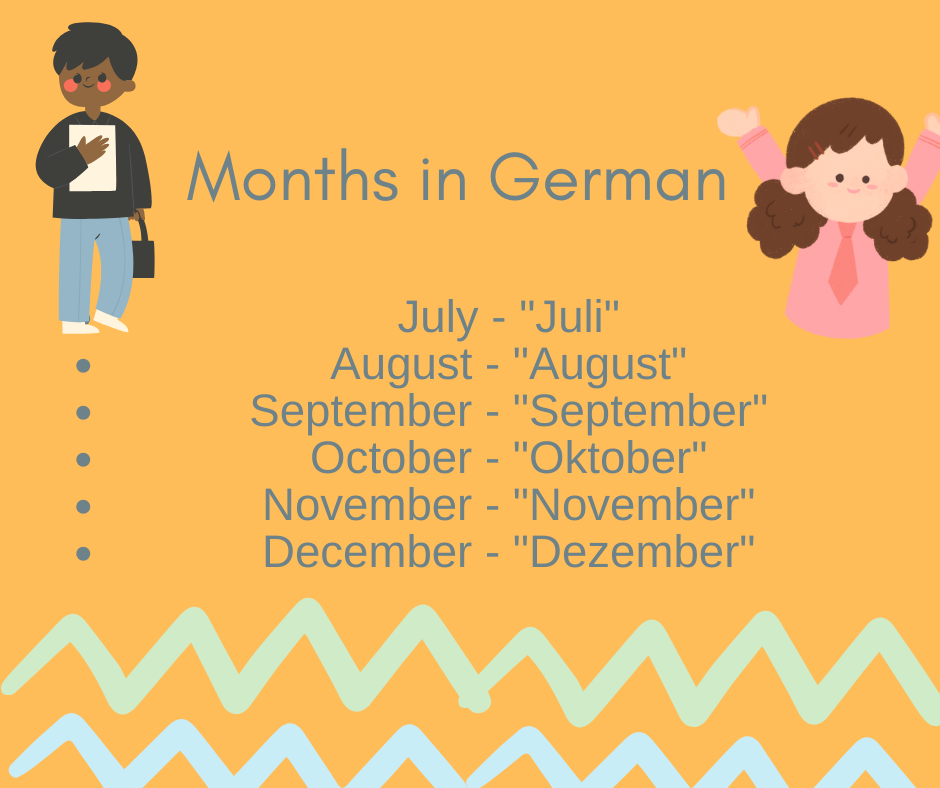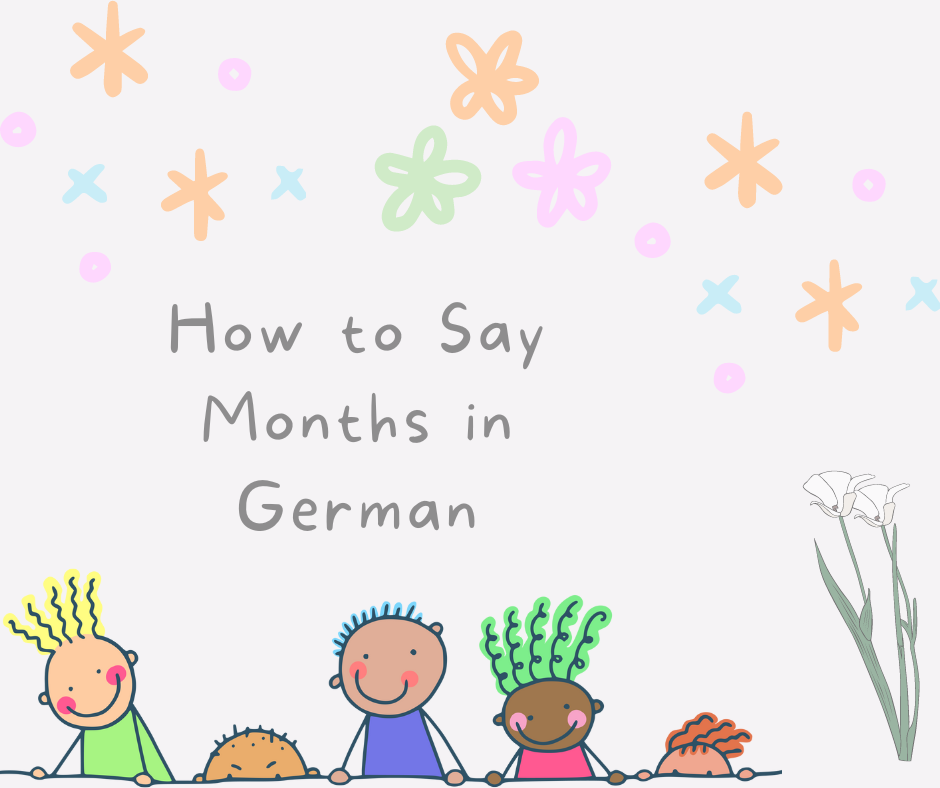Improving how you say days, weeks, months, and years is fundamental to learning a language.
A crucial early milestone in mastering a new language is understanding how to read the calendar.
For those wishing to learn German, familiarity with the months of the year is essential, providing a critical skill for effective communication in German. By confidently grasping the months of the year in German, you will enhance your overall language proficiency.
Fortunately, learning the German names of the months is easier than it may initially seem.
This article ensures you effortlessly remember all twelve months. Additionally, we’ll help you with the correct pronunciation each month, making you sound like a natural speaker.
Is it Difficult to Say Months of the Year in German?
Not at all! Learning the months of the year in German is surprisingly straightforward, especially for English speakers. English and German share a common Germanic linguistic foundation, making the two languages quite similar.
In fact, three out of the twelve months are precisely the same in both languages, and most others only differ by a letter or two. Whether planning a business trip to Germany or simply exploring new languages, taking the time to learn the German months is a worthwhile endeavor.
It’s an accessible task for English speakers, and you can even make it a fun family activity by involving your kids in the learning process.
Furthermore, the effort to learn German is highly appreciated by locals. Your German colleagues, friends, or family will likely commend your commitment to understanding their language, making way for a stronger connection through shared linguistic appreciation.

Months in German – History, Interpretation and Pronunciation
January – “Januar”
Derived from the Roman God Janus, January holds a rich historical significance. Janus, depicted with two faces—one looking to the past and the other to the future—symbolizes transitions and beginnings.
Pronouncing “Januar” in German:
To articulate “Januar” in German, initiate with the crisp sound “ja” (“yah”), mirroring the pronunciation as in English.
This opening syllable honors the Roman God Janus. Then, incorporate “nuar” (“nooh-ar”) to complete the pronunciation.
The rhythmic combination of “ja” and “nuar” echoes the duality represented by Janus.
February – “Februar”
February, the second month of the year, draws its name from the Roman festival Februalia, a period of purification and cleansing.
Pronouncing “Februar” in German
To pronounce “Februar” in German, start with the soft sound “fee,” similar to the English word “fee.”
This initial syllable captures the essence of the month’s name. Follow this with the familiar “uar” (“nooh-ar”) sound, the same as the pronunciation of January in German.
When articulating “Februar” in German, you gracefully combine the “fee” and “uar” sounds.
March – “März”
March, the third month of the year, pays homage to the Roman god Mars, who symbolizes war, courage, and military prowess. In ancient Rome, this month marked the beginning of the army campaign season as winter subsided, making it a fitting dedication to Mars.
Pronouncing “März” in German
The umlaut in “März” may seem daunting, but fear not—it’s really simple.
Pronounce it as “mehrts,” with the ‘ä’ sound similar to the English ‘e’ in “her.” Commence with the soft “m” sound, then transition to the ‘ä,’ and conclude with the ‘rz’ pronounced like “ts.”
April – “April”
April, synonymous with the arrival of spring, derives its name from the Latin word “aperire,” meaning “to open.” This connection beautifully encapsulates the essence of the month as nature unfolds, flowers bloom, and life renews. April stands as a symbol of rebirth and growth.
Pronouncing “April” in German
Pronouncing “April” in German involves an understanding of phonetics. Unlike its English counterpart, where the emphasis falls on the first syllable, the German pronunciation stresses the last part, “pril.”
The vowel “A” in German is similar to the American “ah.” So, envision it as “ah-pril,” with the emphasis on “pril.”
The German pronunciation of “April” conveys the cultural and linguistic relevance to its history. It aligns with the seasonal theme of renewal and the unveiling of nature’s wonders.
May – “Mai”
The month of Mai draws its name from the Roman goddess Maia. In Roman mythology, Maia is associated with growth and fertility, making May a symbolic celebration of nature’s blossoming and the abundance of life.
Pronouncing “Mai” in German:
To pronounce “Mai” in German, think of the cocktail drink “Mai Thai.”
The pronunciation is similar to the drink, and you’ll effortlessly be able to pronounce the word in German.
Pronounce it as “my,” with a soft “i” sound, creating a harmonious blend that mirrors the emergence of spring.
By associating the pronunciation of “Mai” with the familiar “Mai Thai,” you infuse the touch of cultural connection, German pronunciation both delightful and memorable.
June – “Juni”
June, the radiant month that ushers in summer’s warmth derives its name from the revered Roman goddess Juno. As the wife of Jupiter, Juno is associated with marriage and well-being, making June a month often linked with celebrations of love and prosperity. The etymology of Juni traces back to this divine figure, adding a layer of cultural significance to the month.
Pronouncing “Juni” in German:
In German, pronouncing “Juni” is simple. Combine the sounds of “you” as in the English word “you” with “nee.” It flows as “you-nee,” maintaining a smooth transition between the two syllables. Emphasize the “nee” part gently.
The amalgamation of sounds mirrors the simplicity and elegance associated with the German language. Adopting the “you-nee” pronunciation ensures clarity and cultural resonance, allowing you to communicate with precision and finesse.
July – “Juli”
July, basking in the warmth of summer, is named in honor of the mighty Roman god Jupiter. Jupiter, associated with thunder and lightning, lends July an aura of power and significance. As the largest planet in our solar system, Jupiter’s influence extends to a month filled with vitality and energy.
Pronouncing “Juli” in German
Pronouncing “Juli” in German is quite simple. Following the pattern established with “Juni,” articulate it as “yoo-lee.”
Begin with the familiar “you” sound, similar to the English word “you,” and gracefully conclude with “lee.” Maintain a smooth transition between the syllables, emphasizing the “lee” component.
This pronunciation aligns with the linguistic simplicity characteristic of German. By adopting “yoo-lee,” you effortlessly adhere to phonetic consistency. This approach ensures clarity in communication, allowing for a professional and refined expression of the month’s name in German.
August – “August”
August, deriving its name from the Latin word “Augustus,” has a rich historical origin. This month is dedicated to the revered Roman Emperor Augustus, who significantly influenced the establishment of the Roman Empire and its golden age. Originally called Sextilis in Latin, August was later renamed in 8 BCE to honor Emperor Augustus, marking the period of several important events in his life.
Pronouncing “August” in German
In German, the pronunciation of August is similar to English, with a slight emphasis on the first syllable. Pronounce it as “ow-gust,” where the “ow” sound resembles the English word “how.”
It involves a distinct “ow” sound, followed by a seamless transition to the familiar “goost.”
The emphasis on the pronunciation is placed on the first syllable, creating a harmonious flow that resonates with the name’s Roman origins.
So, as you immerse yourself in the beauty of the German language, remember to infuse the spirit of “ow-goost.”
Ensure a smooth transition between the two syllables, and you’ll capture the essence of the word.

September – “September”
September, a month that carries both linguistic intrigue and historical resonance, holds its roots in the Latin word “septem,” meaning seven. Despite its name, it wasn’t always the ninth month in the Roman calendar.
In fact, it was the seventh month before the addition of January and February. The calendar’s evolution pushed September to its current position, yet its name continues to echo its original numerical association.
Pronouncing “September” in German
Pronouncing September in German involves a subtle modification. Instead of the typical English hard “s” sound, embrace a softer “z” sound.
September, articulated as “zehp-tehm-ber” in German, weaves a tale of linguistic evolution and historical nuance. Allow the “z” to flow smoothly, and you’ll capture the essence of the German pronunciation.
Pronounce it as “zep-tem-ber,” emphasizing the first syllable. As you navigate the intricacies of pronunciation in German, remember to let the “z” flow effortlessly, creating a melodic cadence.
October – ” Oktober “
October, or Oktober in German, derives its name from the Latin word “octo,” signifying eight. While it currently holds the tenth position in our calendars, it originated as the eighth month in the ancient Roman calendar. The shift in its numerical ranking occurred with the introduction of January and February.
Pronouncing “Oktober” in German
When pronouncing Oktober in German, a key adjustment involves replacing the English “c” with a “k,” as previously mentioned.
To master the pronunciation of Oktober in German, consider a subtle shift in the sounds.
Additionally, focus on the “Os” — in German, the first “O” sounds more like the English “uh,” while the second “o” is elongated.
The pronunciation is “ok-toh-ber,” with a subtle emphasis on the first syllable.
So, articulating “ok-toh-ber” is a harmonious blend of language and history.
November – “November”
November, derived from the Latin word “novem,” meaning nine, is an intriguing month.
Despite its current position as the eleventh month in our calendars, it was originally the ninth month in the ancient Roman calendar before calendar reforms adjusted its placement.
Pronouncing “November” in German
A subtle modification is required in the German pronunciation of November, similar to its predecessor, Oktober.
Focus on the letter “o,” transitioning it to sound like “no-vehm-ber.” The first “o” has a more pronounced “uh” sound and elongates the second “o.”
This pronunciation, where the emphasis naturally falls on the first syllable, captures the essence of the German language.
December – “Dezember “
December, known as Dezember in German, originates from the Latin word “decem,” meaning ten. Despite its current placement as the twelfth month in our calendars, it initially held the position of the tenth month in the ancient Roman calendar.
Pronouncing “Dezember” in German
To pronounce Dezember in German precisely, replace the English “c” with a “z,” as highlighted earlier. Pay special attention to the first “e,” pronouncing it as “deh.” It is similar to the pronunciation of “deh-tsem-ber,” emphasizing the initial syllable.
The journey from Latin to German adds cultural depth to your linguistic exploration. With consistent practice, “deh-tsem-ber” will flow effortlessly from your tongue.
Takeaway
Mastering the pronunciation of months in German is a journey enriched with historical significance.
From Januar to Dezember, the key lies in subtle adjustments, such as switching the English “c” to “k” and embracing unique vowel sounds.
These linguistic changes enhance your pronunciation and connect you to the roots of the months, revealing their origins in ancient Roman calendars.
As you say Januar, Februar, März, and so forth, remember that each month carries a cultural and historical story.
So, make it more than just pronunciation practice—immerse yourself in the richness of language and history encapsulated in each month.


 February 20, 2024
February 20, 2024  10 Min
10 Min  No Comment
No Comment 



